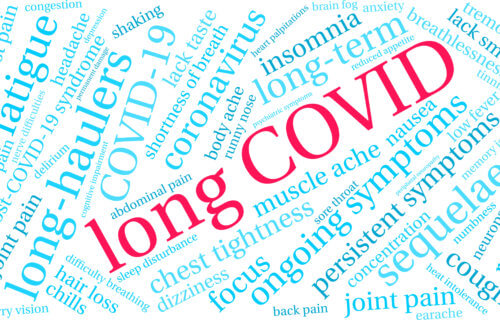SAN FRANCISCO — Long COVID remains one of the more puzzling aspects of an already confounding pandemic. Even today, doctors and scientists alike still struggle to agree on an exact definition for the array of lingering, long-term side-effects reported by so many “recovered” COVID-19 patients. Now, a thought-provoking new study argues that the threat of long COVID has been overblown by a flawed body of research thus far.
An international team of researchers from the University of California-San Francisco, the University of Southern Denmark, and St. George’s University of London point to a combination of overly broad definitions and a lack of appropriate (or any, in many cases) comparison groups, among other factors, as contributing to the distorted risk perception of long COVID. In other words, research efforts so far to assess and understand long COVID’s incidence, prevalence, and control of the condition, or epidemiology, have largely missed the mark.
Moreover, the inclusion of poorly conducted studies into systematic reviews and pooled data analyses also likely played a part in all this, the study authors explain. Researchers add that such flawed research efforts have almost certainly contributed to a number of negative consequences. Those include increased public anxiety and healthcare spending; misdiagnoses; and diversion of funds from others who really are experiencing long-term conditions secondary to COVID-19 infection.
This latest report notes that many after-effects linked to COVID-19 infection include post-ICU syndrome, defined as a grouping of health issues present when a patient is in intensive care that continues to persist even after the patient is discharged home, as well as shortness of breath following pneumonia. While such symptoms may legitimately be caused by long COVID, they are also very common among many upper respiratory viruses, researchers point out.
In fact, the research team stresses that none of the current working definitions of “long COVID” used by influential health bodies all over the world, such as the CDC and WHO, actually require a causal link between the virus responsible for COVID-19 (SARS-CoV2) and numerous symptoms.

So, what can be done to improve long COVID research moving forward? Study authors recommend control groups be included in new long COVID studies, and ideally, these cohorts should be matched up according to age, sex, geography, socioeconomic status, and, if possible, underlying health and health behaviors.
At the beginning of the pandemic, when SARS-CoV-2 testing wasn’t widely available, studies were much more likely to include a non-representative sample of SARS-CoV-2-positive patients by including fewer people with mild or no symptoms at all. This practice, called sampling bias, happens when certain members of a population have higher chances of being included in a study sample than others in the same population and is generally thought to lower a research project’s generalizability to the public at large.
“Our analysis indicates that, in addition to including appropriately matched controls, there is a need for better case definitions and more stringent [‘long COVID’] criteria, which should include continuous symptoms after confirmed SARS-CoV-2 infection and take into consideration baseline characteristics, including physical and mental health, which may contribute to an individual’s post COVID experience,” the researchers write in a media release.
They add that the umbrella term “long COVID” should be retired in favor of different terms for specific symptoms. Thus far, the results of high-quality population studies focusing on long COVID in both adults and kids have proven quite reassuring, study authors note, but also caution the current body of research “is replete with studies with critical biases.”
“Ultimately, biomedicine must seek to aid all people who are suffering. In order to do so, the best scientific methods and analysis must be applied. Inappropriate definitions and flawed methods do not serve those whom medicine seeks to help,” the authors write. “Improving standards of evidence generation is the ideal method to take long COVID seriously, improve outcomes, and avoid the risks of misdiagnosis and inappropriate treatment.”
The study is published in BMJ Evidence-Based Medicine.
Long COVID has 7 persistent symptoms
COVID researchers have been studying long COVID for almost as long as the viral itself. While some teams have identified more than 200 symptoms with a link to long COVID, one study argues there are typically only seven which patients persistently experience for weeks, months, and possibly years.
The seven long COVID symptoms are:
- Rapid heartbeat
- Hair loss
- Chest pain
- Fatigue
- Joint pain
- Shortness of breath
- Obesity


Seriously? And just how many of these people took the injection?
Seriously? These so-called “seven symptoms of long Covid” don’t even remotely resemble any of the known symptoms of an actual Covid infection. Anyone who’d believe this lunatic claim really needs to get their head examined. Those unrelated “symptoms” are actually much more indicative of what one would expect to find in a typical case of a mRNA vaccine injury.
Idiots who believe the totally corrupt medical system get “long covid”. It is caused from stress watching the (((MSM))) lie about “covid danger”, and also wearing a mask hours a day. No one who ignored the MSM nonsense got long covid.
Wow I have long covid, either that or I am fat and old.
All symptoms are there even the hair loss.
When the sniffles took to the airwaves all other illnesses took a backstage as regular consultations and testing were put on hold, some never to return. For some it has become an obsession that ignores the system that existed prior to the madness.
why would we believe this from the very people that spread this dreadful, engineered virus…how can it even be possible that some segment of society wants so many lives gone? Evil is among us and I believe civilization cannot survive as it is with the current horrible things being perpetrated on human beings…sounds like a prophecy to me…
No indication as to whether these people having the long Covid symptoms were vaccinated. Many of the symptoms are associated with the vaccine side effects.
I am not aware of any credible objective evidence that any of the vaccines cause or that vaccine symptomology demonstrates a strong correlation with Long Covid symptomology. If you have such evidence, will you please post a link to the research.
This said, vaccine status (none, first round, booster, etc.) is an important independent variable that should be examined,
Just take your boosters, because government, media, doctors, nurses, and big pharma love and care for you. Do whatever they say.
This headline is not correct. If you read the actual article you will see that it is pointing to methodological flaws of varying degrees of importance in studies related to Long Covid. Nothing in the authors’ conclusions suggest whether Long Covid will turn out to be more or less of a problem than we currently believe. Not good news for the ready/fire/aim approach.